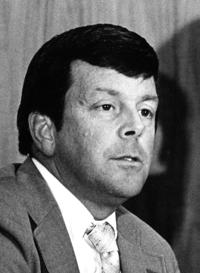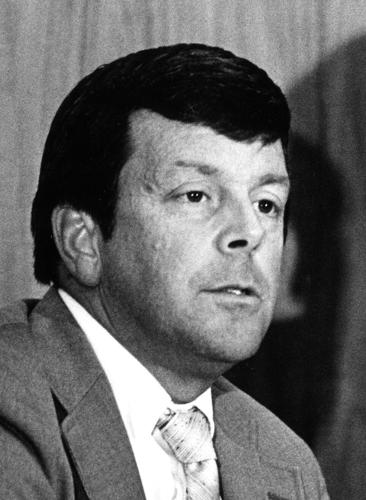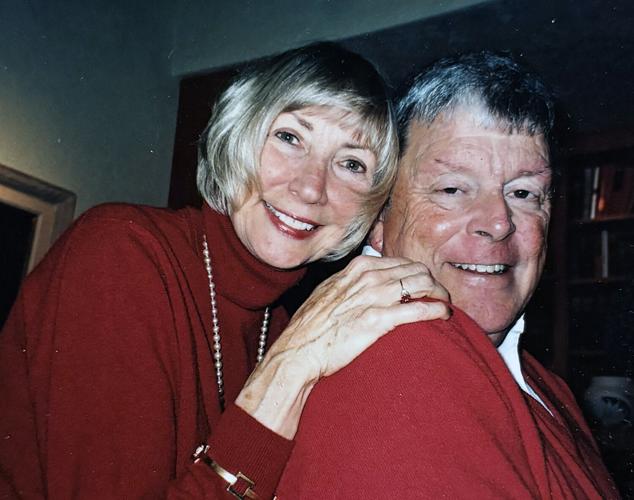You would think that if your big brother was the police chief, his officers would cut you some familial slack.
Not during Peter Ronstadt’s tenure.
“I got pulled over for a ticket one day and he saw that I was Peter’s sister, which would mean I’d get two tickets,” Ronstadt’s sister Linda said Tuesday, two days after her big brother died. “His instructions (were) that any of his relatives got a ticket they get two tickets.”
Peter Ronstadt, Tucson’s police chief from 1981 to 1991, experienced health problems in recent years and had broken a hip in November, family members said. He was 82 and surrounded by family when he died on Sunday.

Former Tucson Police Chief Peter Ronstadt
Peter, the second oldest of Gilbert and Ruth Mary Ronstadt’s four children, sang in a trio with his big sister Suzy and Linda. When baby brother Michael was old enough, he, too joined the sibling group, singing at family gatherings.
People are also reading…

A young Peter Ronstadt, far right with guitar, performing with his sisters Suzy and Linda, center, and others. Later the Ronstadt siblings would form a folk trio, The New Union Ramblers.
“He was fun to sing with,” recalled Linda, who left home at 19 to pursue a professional music career. “He sang so beautifully.”
Peter sang with the Tucson Arizona Boys Chorus as a boy.
“He sang the ‘Ava Maria’ and a song called ‘Estrellita’,” she said. “He had this beautiful high soprano voice, the purest it could be, real in tune. He was always a really good singer.”
In 1987, when Linda, one of the most decorated female vocalists of all time, was recording her seminal “Canciones de mi padre” mariachi album, she invited brothers Michael and Peter and Peter’s then teenaged daughter Mindy to sing on the album. They also were part of the 1991 follow-up album “Mas Canciones.”
“Peter, you know, all those years, hadn’t been a professional musician, but he’s so good,” Linda recalled. “He showed up. He sang really good harmonies. His voice blends together easily. He always had the most beautiful voice.”
Peter displayed his gold record from that triumph in “the music room” at his longtime house on the city’s far northeast side, said his son Philip Ronstadt. That’s where the guitars, piano and other instruments were kept, but “the playing was done in the living room,” he said, and it was glorious with all of the musical talent in the family.

Peter Ronstadt, with his gold record behind him for singing on sister Linda’s “Canciones de mi padre” album.
“He always wanted to be a musician, probably,” Philip said. But he was also drawn to the thought of helping people through police work, attended the academy, joined the Tucson Police Department in 1963 and rose up the ranks to become chief in 1981.
One morning while driving to work as chief, he heard on the scanner that a man was walking on Interstate 10, dodging fast-moving cars. He swung by and helped to apprehend a disheveled 19-year-old Tucsonan named Robert Bardo.
“Well, this guy says he’s the one who killed the actress in Hollywood,” Peter told a KOLD-TV reporter at the scene, according to later trial testimony.
Bardo, an obsessive fan, had shot and killed TV actress Rebecca Schaeffer at her front door in Hollywood the day before his July 19, 1989 arrest by Ronstadt and other Tucson officers. He is serving life in prison.
“The thing that struck me that I always thought was cool,” Philip said, is that his father pointed out police often deal with people on “possibly their worst day,” and “he was grateful to help.”
Peter was quoted in an April 23, 1990 article in the New York Times headlined, “New police chiefs put new ideas on the force.”
From the article: “Much of the change is rooted in reaction to the riots of the 1960’s, most of which were ignited by seemingly routine encounters, often between white police officers and black citizens. Several major studies, including a Presidential commission, cited the social isolation of urban police departments, made up largely of white men.”
Ronstadt was quoted as saying, “There was too much separation. Professional detachment from the community is fine when society is static. It preserves the status quo. But facing the sweeping social changes of the Sixties, integration, rising minority aspirations and so forth, police became the establishment’s occupying force and actually helped cause conflict.’’
‘’Some people still see crime as a police problem,’’ he continued. ‘’So I deliver the message everywhere that we accomplish amazing things by winning neighborhood cooperation.’’
He was a strong advocate of “grassroots, neighborhood-level community policing, neighbors helping neighbors,” his son Philip noted.
Neighborhoods and local roots were paramount to Peter, who flat out said “nope, I’m not leaving Tucson,” when his name was floated once for Los Angeles police chief.
Born at St. Mary’s Hospital and raised here, he attended Sts. Peter and Paul Catholic School, Doolen Junior High and Tucson High School. He graduated from the then- new Catalina High School in 1959 and met his wife, Jackie, while attending the University of Arizona. They celebrated their 60th wedding anniversary this November.
Linda Ronstadt continues her Tucson Festival of Books panel with stories about her childhood. Her book "Feels Like Home: A Song for the Sonoran Borderlands" highlights her life and legacy. Video by Pascal Albright/Arizona Daily Star
He retired in 1992, “feeling like he’d done what he could” and tired of politics and administrative realities that made him “less of a cop and more of a politician,” his son said.
That gave him more time with family, “so important to him,” and to play guitar and banjo with passels of Ronstadts. He and Jackie also traveled extensively together, on diving trips to Mexico and the Caribbean, for instance, and driving from Tucson to Alaska. He was an avid gardener, cyclist, camper, snorkeler, scuba diver, 4-wheeler and hiker.

Peter Ronstadt with his wife Jackie.
Peter was in Tucson Rotary Club, The Tucson Centurions, was a trustee for the Southwestern Foundation for Educational and Historical Preservation, and served on the boards of numerous community organizations.
Linda, who lives in California, said she hadn’t spoken with Peter in some time — “We both are deaf so we don’t speak very much on the phone,” she said — but over the past several months, she had been sending him recordings she did with him “just to see what he thought.”
“I don’t think he’s heard them since we recorded them,” she said.

Peter Ronstadt, in sunglasses at right, performing with his cousin Bill Ronstadt, daughter Mindy, and Bill Martin. Peter had been called up to join Mindy and the Two Bill Band for a song or two.
“My dad — and I think Linda would say this, too — was the rock of the family,” Philip said. “He’s the one people would go to” for help or support. “A responsible guy, always strived to do the right thing, very even-keel.”
Peter Ronstadt was preceded in death by siblings Suzy (Gretchen) and Michael — “they’ve all passed except for Linda now,” Philip said.
In addition to sister Linda and son Philip, he is survived by his wife Jacqueline, daughter Mindy, and four grandchildren, Justin, Olivia, Mia and Levi.
He didn’t want a service, “but as he was a big supporter of both the Arizona-Sonora Desert Museum and The Salvation Army, donations to those organizations are much appreciated,” the family said.











